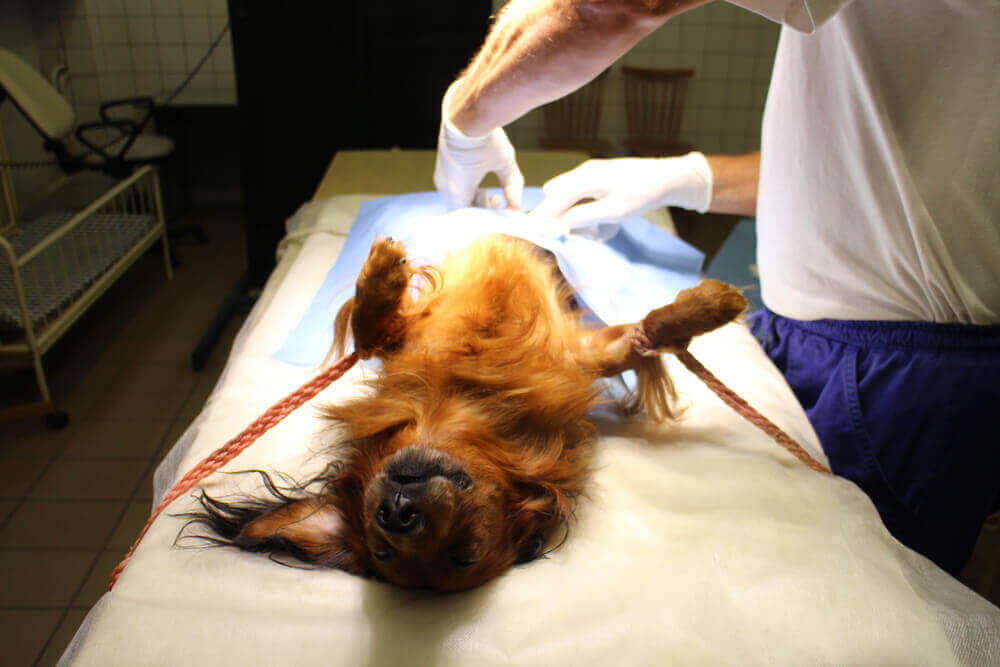
It is a common confusion on the part of pet owners whether to spay or neuter their pet or not. If you are a new pet owner you must be probably wondering whether to spay your pet or not. Let us learn more about petspay and neuter and their advantages
Spray or Neuter?

Difference between spay and neuter
The terms spay and neuters are usually used interchangeably. A spay is usually performed in female dogs where the uterus is removed under general anaesthesia. An incision is made in the abdomen through which the uterus and ovaries are taken out. This surgical procedure is also called an ovariohysterectomy.
In neutering, also called castration a male animal’s external genitalia is removed. This is a minor surgery compared to spaying where the testes are removed under general anaesthesia.
Health benefits of spaying
We all see dogs and several other animals straying around the streets without enough to eat and shelter in extreme climates. This pet homelessness is a great issue in modern society. Besides, the unavailability of natural resources also makes it very difficult for pet animals. So, spaying your female pet alongside neutering the male pet will be a helpful hand for you to solve this problem.
Besides, the behavioural benefits and the medical advantages that come with the processes of spay and neuter are also notable.
- There is a big percentage of cats and dogs are being reported with breast and other uterine infections that are seen in pets every year. By spaying your female pet, the chances of these diseases become very small. All in all, this means that your pet gets to spend a lot more years with you.
- Another benefit of spaying is that it will make your female pet calm during the breeding season and it’s commonly twice a year. Usually, they will run around and shout with whatever sound they have to give a newsletter to the male species. After spaying, these situations can be removed from their normal routine of the season.
- Relentless howling in cats is a result of this heat in this period. They too make sounds and urinate everywhere to attract males into the unwanted territory. All these can be stopped by spaying your pet.
6 reasons to spay/neuter your pet
Spaying or neutering can give your young pet a healthy start. Here are seven good reasons why you should spay your pet.
1. Longer life
Spaying or neutering will help your pet live longer. Spaying eliminates the risk of many infections and disorders which ends in the early demise of pets. Since the external and internal genitalia is more prone to such diseases, spaying will help your pets enjoy a longer and healthier life. In a recent study conducted among pets, it was found that spayed dogs and cats relished a longer lifespan by 30% while their unaltered counterparts didn’t. Spayed animals are less likely to develop ailments like cancer, pyometra and urinary infections.
2. Less aggressiveness
A neutered or spayed male animal shows less aggression towards its fellow animals, especially females. They are not distracted with mating needs and are more docile. Neutered pets are also less likely to wander around looking for potential mates. Castrated dogs will not mark your furniture and stud with urine to claim females either.
3. No unwanted pregnancy
There is no potential risk of pregnancy in pets anymore and you can sleep in peace with that in mind. Unwanted birth of puppies and kitten can cause chaos inside the homes and can be a severe cause of a headache to the pet owners. Uncontrolled pregnancies also lead to a litter of smaller pets taking over your house. Instead of having to discard and abandon younglings, preventing pregnancy can be a safer option to tackle this problem.
4. Cleaner pet
Pets in heat or during meat season can secret body fluids. There can also be menstrual fluids as part of their oestrous cycle. This is such a nuisance to the pet owner as he/she finds themselves constantly cleaning the carpet and cushions stained with nasty fluids. Spaying pets results in a cleaner environment as this problem is neutralized (no pun intended)
5. Curb unwanted behaviours
Spaying also causes behavioural changes in pets. Neutering solves all the urine-marking and squirting issues. It makes the cats and dogs less distracted or irritated. This can also reduce howling, screaming and wandering offs. Males tend to fight less with each other for winning over the female. There are also fewer territorial brawls. Typical dog actions like roaming, excessive barking and mounting problems are also solved with spaying.
6. Saves money
An unaltered pet can cause you large expenses in the future. Pregnancies and related expenses can make you lose significant weight in your wallet. So all in all, spaying can be a great way to reduce expenses. Many neuter clinics can conduct neutering at affordable costs. Remember, unaltered pets invite diseases, injuries related to fights and mating tendencies and pregnancies. Not to mention the obvious overpopulation problem. You can reduce the veterinary costs by a large margin if you get your pet altered early.
7. Spaying in rabbits
Any rabbit owner would know that rabbits reproduce and multiply at an exponential rate. So neutering is very crucial to avoid population explosion on pet rabbits. It also reduces other unwanted mating patterns like jumping, mounting and lunging. Also, the chances of ovarian and mammalian diseases are shortened in female rabbits.
At what age should the pet be spayed?
It would be best if pet owners consult a certified vet to decide on the age of spaying. Many dog owners pose the question of when to neuter dogs. You must also connect with your breeder to know if it is safe to neuter them at a particular age.
Dogs
The recommended age of dogs to get neutered is six to nine weeks. But healthy puppies even as young as nine weeks can be safely made sterile. Adult dogs have more risk of complications when they are neutered. As the age increases, the efficiency of spaying decreases. So it is better to get your dog neutered as early as possible.
Cats
The age to neuter kitten can vary depending on the breeds. Kittens as young as eight weeks can be spayed. It is recommended to get your cat spayed before they reach the age of five months. This can reduce the possibility of urinary discharge and pregnancies in female cats. For more information, contact your veterinarian and schedule a date accordingly.
Recovery time for spaying/ neutering
The time after the spaying or neutering process of your pet is very important because of the care they needed. And the recovery time after these major surgical procedures is 14 days. During this period, you can’t take your pet for a bath or do extreme activities with them. Enough rest and an eye on the incision parts are essential during this time.
In the case of human beings, the minimum time for recovery suggested is one month at least. But for your energetic pet, this might be a problem. So, at least 14 days must be used for complete rest for the pet. If it can be done, then the healing process will happen faster. Otherwise, the situation might lead to circumstances that need more medical care and extended bed rest for the pet.
Moreover, in female pets, the surgical site gets cut open with the movement, or hitting something can be dangerous. There are no other barriers than the skin to keep the internal body parts in a female pet. Opening the stitches can cause falling out of the intestines and other body parts. After all, there are no other explanations for the situation than the death of your pet. So, select the best time for you with enough free time to look after the pet for few days to do spaying or neutering.
Recent Posts
- HOW TO PREVENT HAIRBALL ISSUES AND VOMITING IN CATS
- Dental pain in cats: signs, remedies and common dental problems
- Benefits of mobile pets grooming over salons: How to choose the best mobile grooming service in Sharjah?
- Smelly dog? Here are a few tips to remember
- TIPS TO KEEP YOUR PET HEALTH AND PHYSICAL ACTIVITY
Recent Comments